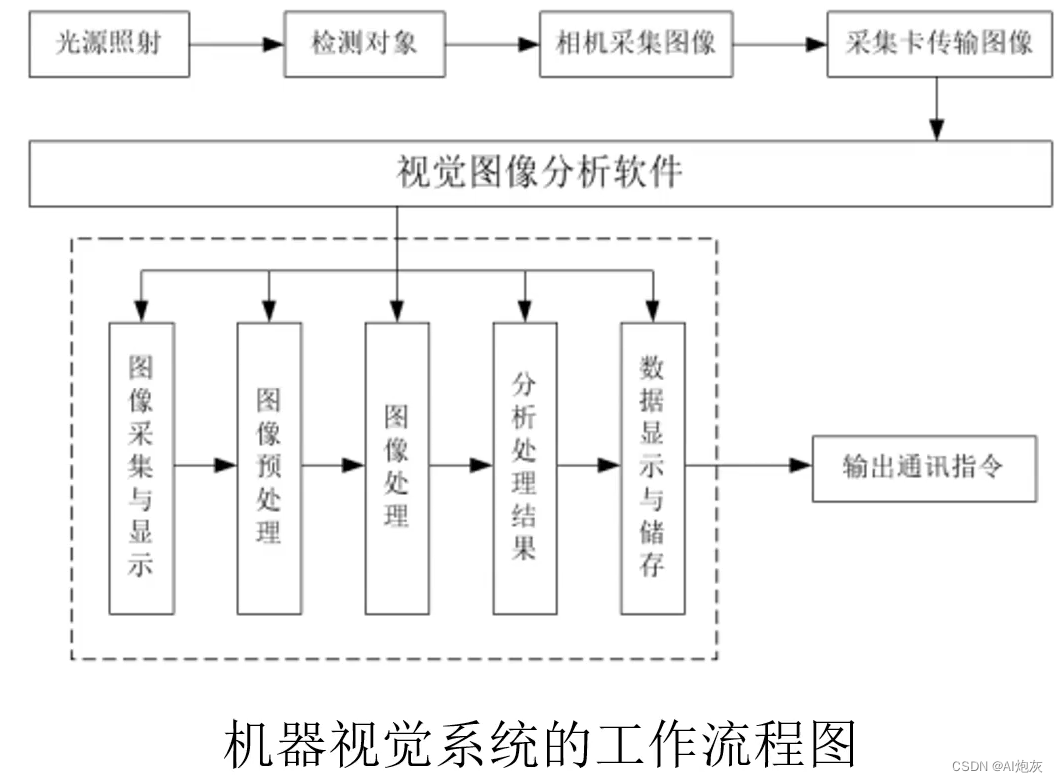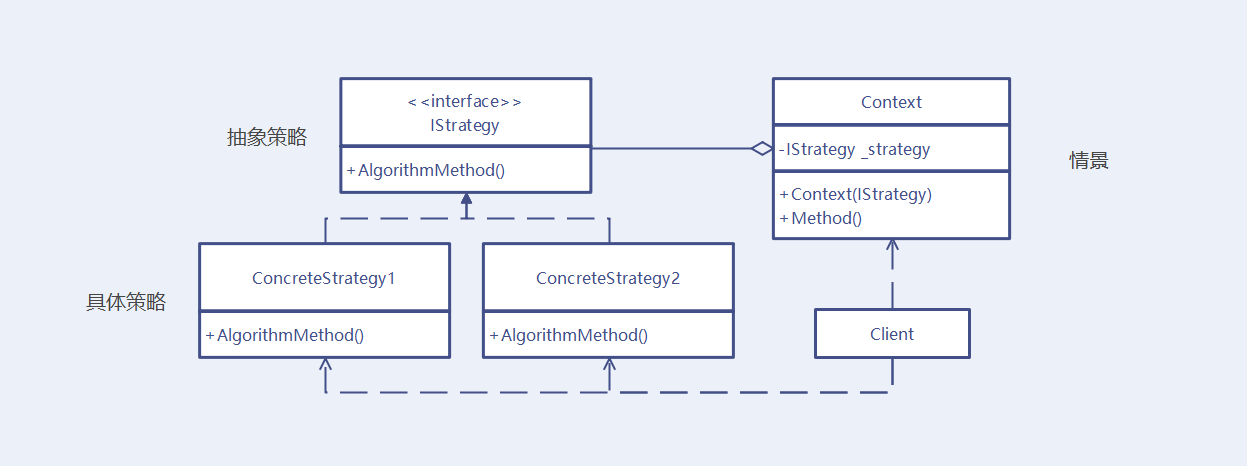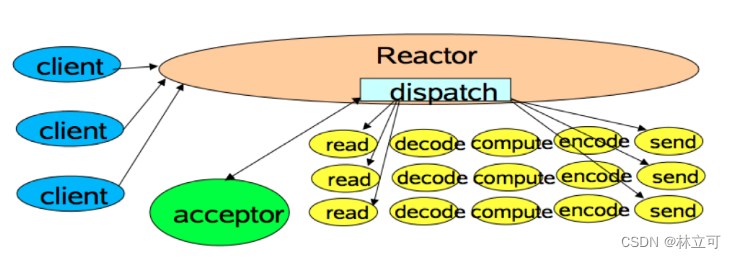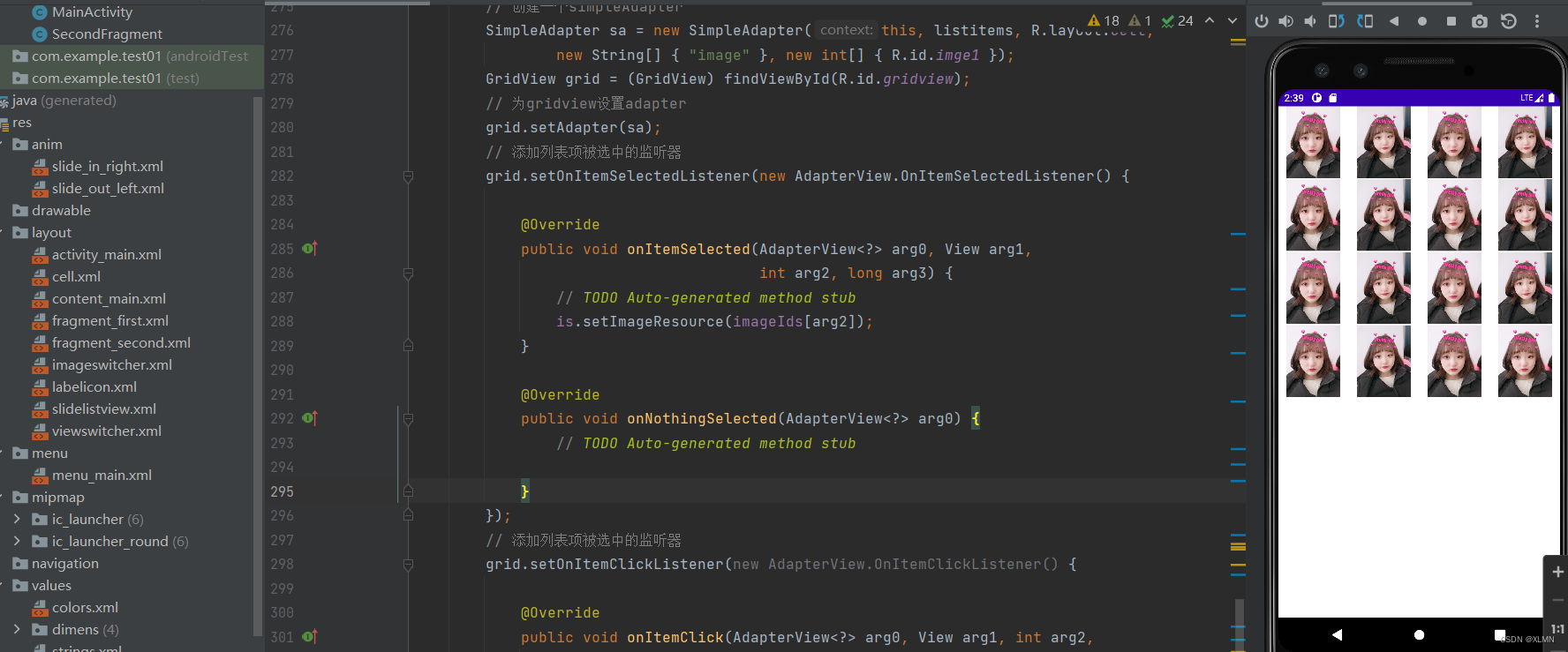当前位置:网站首页>Ansible learning summary (9) -- ansible loop, condition judgment, trigger, processing failure and other task control use summary
Ansible learning summary (9) -- ansible loop, condition judgment, trigger, processing failure and other task control use summary
2022-07-07 17:40:00 【Technology d life】
One 、 Simple cycle
Use loop Format of assignment list :
loop: ## Assignment list
- value1
- value2
- ...
{
{item}} ## Iteration variable name
stay playbook Use in
vim user.yml
---
- name: create user
hosts: server2
tasks:
- name: create user
user:
name: "{
{item}}" ## Iteration variable name
state: present
loop: ## Assignment list
- user1
- user2
- user3

User setup succeeded

Defining variables
vim user_list.yml
---
USERS: ## Defining variables
- user1
- user2
- user3
To write yaml file
vim user.yml
---
- name: create user
hosts: server2
vars_files: ./user_list.yml
tasks:
- name: create user
user:
name: "{
{item}}"
state: absent
remove: yes
loop:
"{
{USERS}}" ## There is no need to add... When assigning values here -
Delete user succeeded
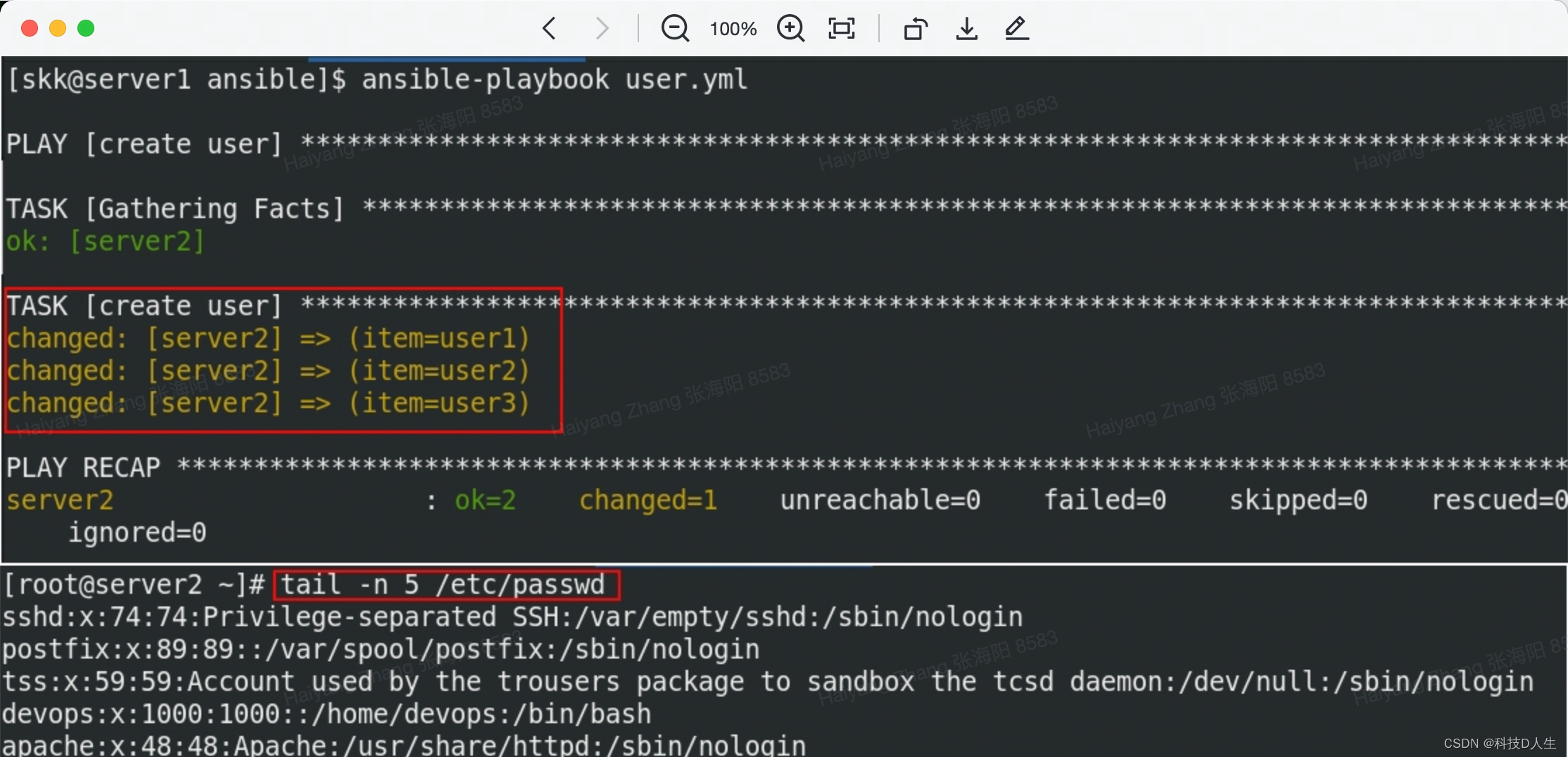
Two 、 Circular hash or dictionary list
Give different services different states
Example : by server3 Host setup user , And give the password ( The password here must be encrypted , Use rhel8 Of openssl passwd -6 Encrypt the password ).

vim user.yml
---
- name: create user
hosts: server3
tasks:
- name: create user
user:
name: "{
{ item.user }}"
password: "{
{ item.passwd }}"
state: present
loop:
- user: user1
passwd: "$6$P2MmG.dGe59uEe0R$SVmq6oojHWvYVK.BZhmL7pWjb7zVKRkUM.Rp2kFbLtl7jS570ZClaVPRZkX9BtfkqlLLCbTrlG7a04YRi/wz3."
- user: user2
passwd: "$6$YZcSU4GwSVBnw.ro$wQ0fAO9lB2M1Nwu9tVyBoGiEV/qOzQGBY.UHw2pQiq0GEjYpNW3c2FtG/wWZ0iVpqZi.iCo1x18LjpJg9tGTK/"
- user: user3
passwd: "$6$lqv/hz7ynndCR9NR$BmhKzFUsW4XzP9x9eAXv782gYBnxWUGFnh1qYExYwof5PSPk36GnlDKjjeygCSohM0cpncmk.1mkljEAgX3FQ1"
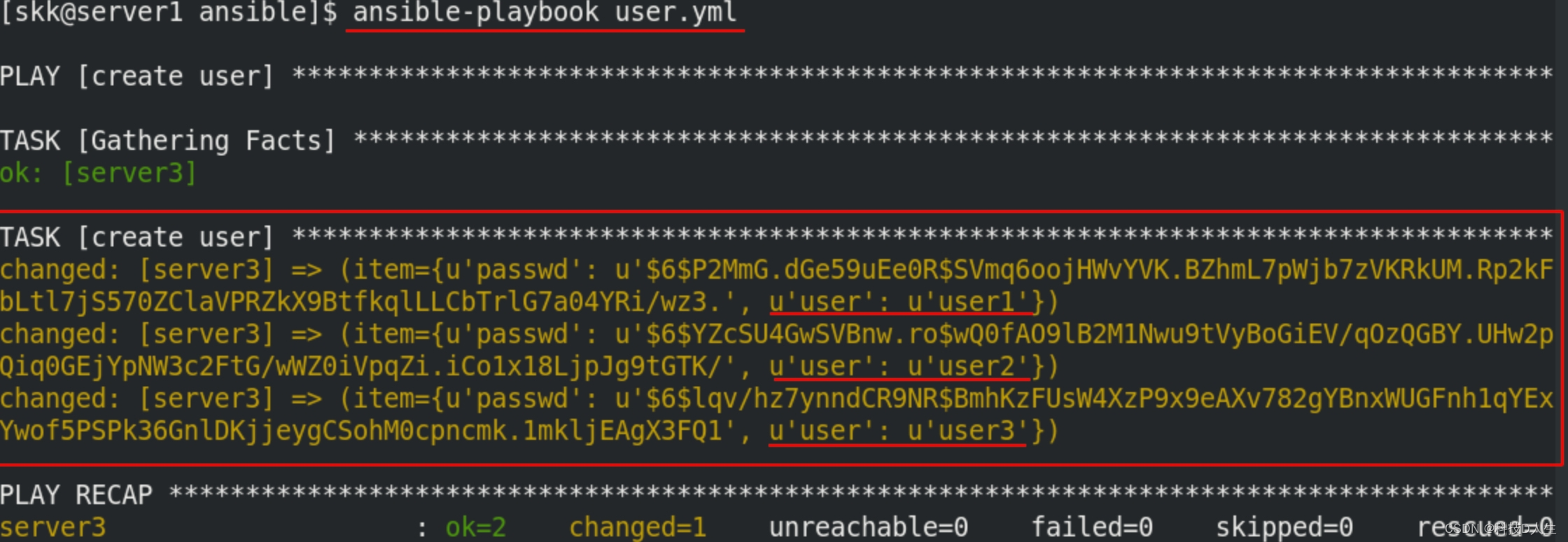
Test connection :

3、 ... and 、 conditional
Both conditions are met at the same time
when:
- Conditions 1
- Conditions 2
One of the conditions
when:
- Conditions 1 or Conditions 2
# It can also be expressed as
when:
- Conditions 1
or
Conditions 2
Example : Check whether the file exists (ignore_errors: yes: When the file does not exist , The system will determine the failure , no return value , Add this parameter to ignore the error ).
vim exist.yml
---
- name: test
hosts: demo
tasks:
- name: test
shell: test -e /mnt/file ## Use shell The module detects whether the file exists
ignore_errors: yes
register: OUTPUT ## Register the results to OUTPUT Variable
- name: show message
debug:
msg: /mnt/file is exist
when: OUTPUT.rc == 0 ## Output result rc Part of it is 0, File exists
- name: show message
debug:
msg: /mnt/file is not exist
when: OUTPUT.rc == 1 ## Output result rc Part of it is 1, file does not exist
stay server4 Create... On the host /mnt/file, stay server2 and server3 Do not create , perform yaml file
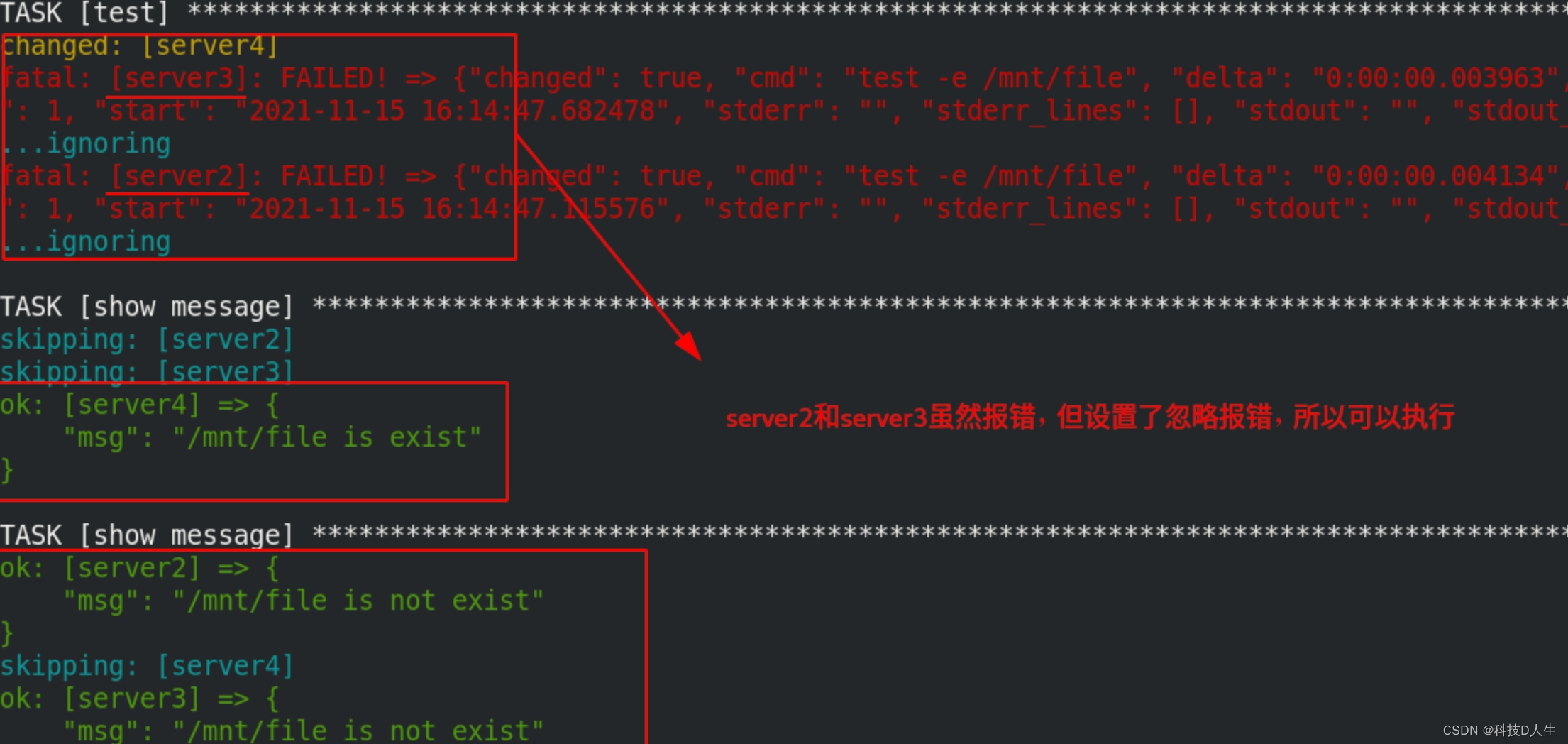
Definition of condition judgment
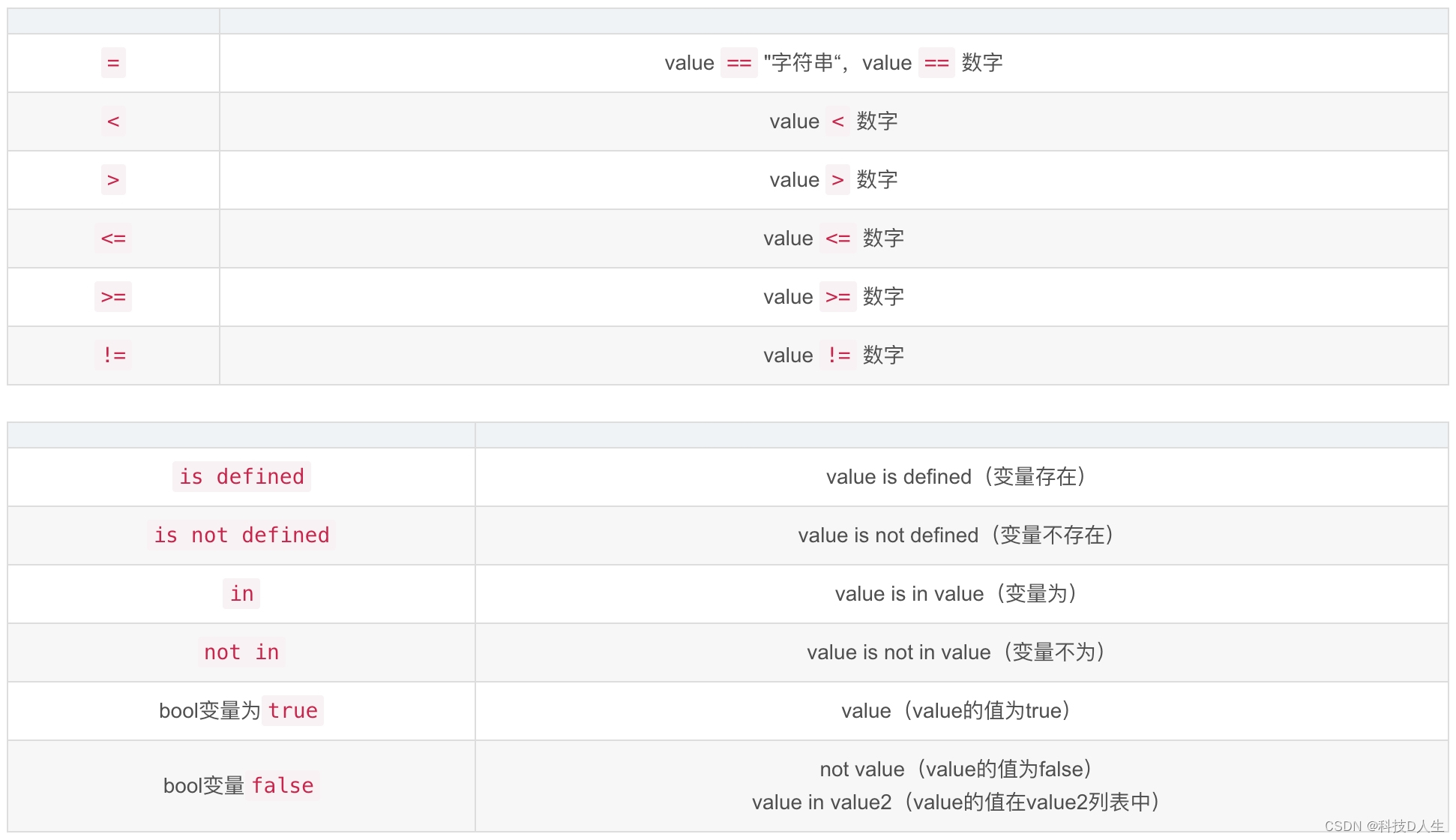
Example : Add disks , Use conditional statements to detect the disk ( by server2 Add disk to host )

adopt ansible Statement can detect
ansible server2 -m shell -a "fdisk -l /dev/vdb"

To write yaml file , Detect the presence of vdb disk
vim vdb.yml
---
- name: test
hosts: demo
tasks:
- name: show message
debug:
msg: /dev/vdb is exist
when:
- ansible_facts['devices']['vdb'] is defined ##vdb In existence
- inventory_hostname in "server2" ##hostname by server2 when , The above conditions must be met at the same time
- name: show message
debug:
msg: /dev/vdb is not find
when:
- ansible_facts['devices']['vdb'] is not defined
or
inventory_hostname not in "server2" ##vdb Does not exist or hostname Not for server2 when , You can also write a line
perform yaml file , Get the results

3、 ... and 、 trigger
notify: Trigger triggers when a change is encounteredhandlershandlers: The action performed after the trigger is triggered
Example : Installation and downloading vsftpd And modify the access home directory ( To write yaml file )
vim vsftpd.yml
---
- name: vsftpd
hosts: server4
tasks:
- name: install vsftpd
yum:
name: vsftpd
state: present
- name: start vsftpd
service:
name: vsftpd
state: started
enabled: yes
notify:
- firewalld ## When vsftpd The service is set to start automatically , Trigger firewalld modular
- name: vsftpd.conf
lineinfile:
path: /etc/vsftpd/vsftpd.conf
line: "anon_root=/mnt" ## Modify access home directory
regexp: "^anon_root" ## Replaced line
backrefs: no ## Replace when matching , No match, then , Add a line at the end of the file
notify:
- restart vsftpd ## When the file is replaced , Trigger the module to restart the service
handlers: ## Triggered module , Pay attention to the relationship between here and tasks alignment
- name: firewalld
firewalld:
service: ftp
state: enabled
permanent: yes
immediate: yes
- name: restart vsftpd
service:
name: vsftpd
state: restarted
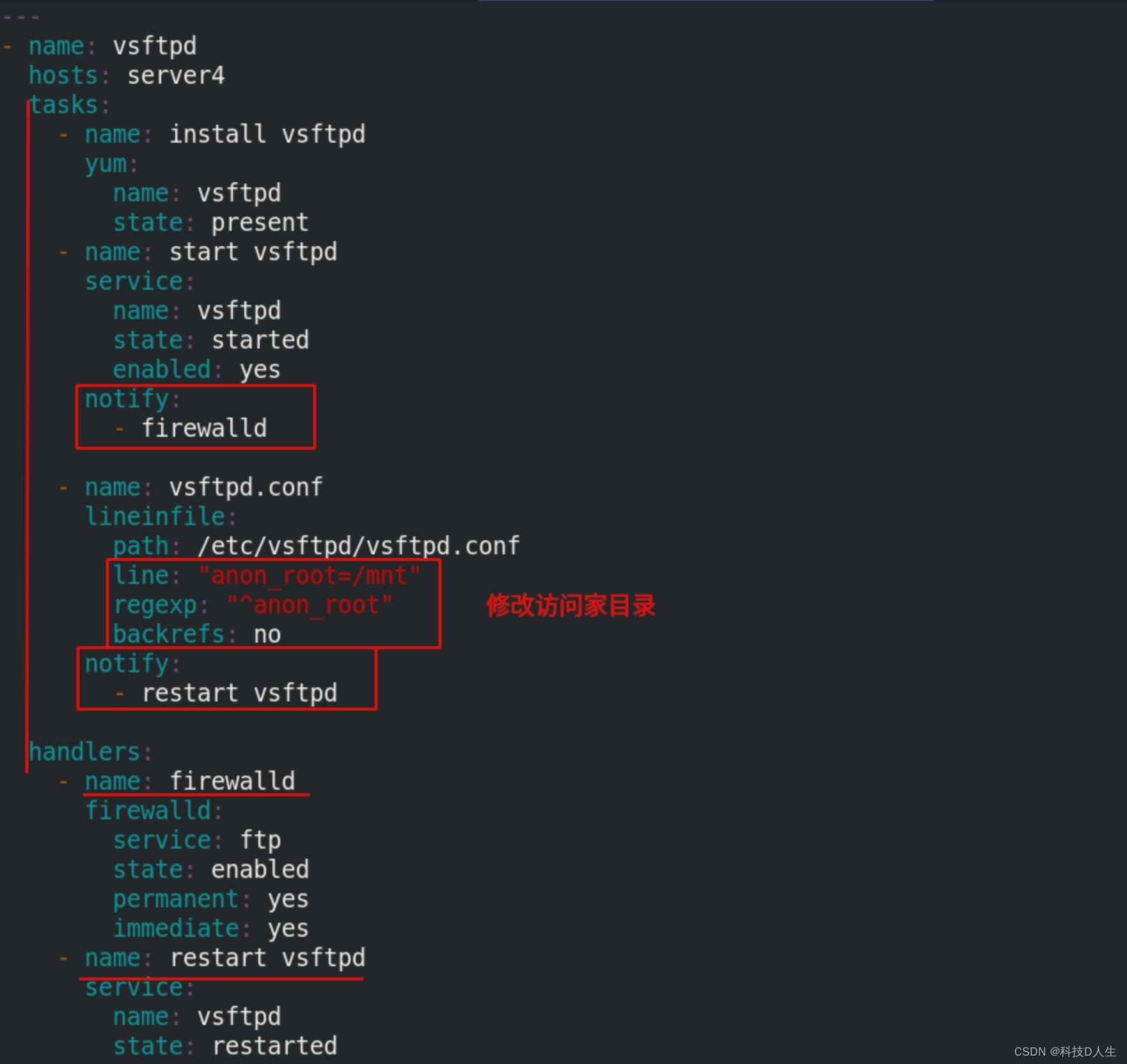
perform yaml file
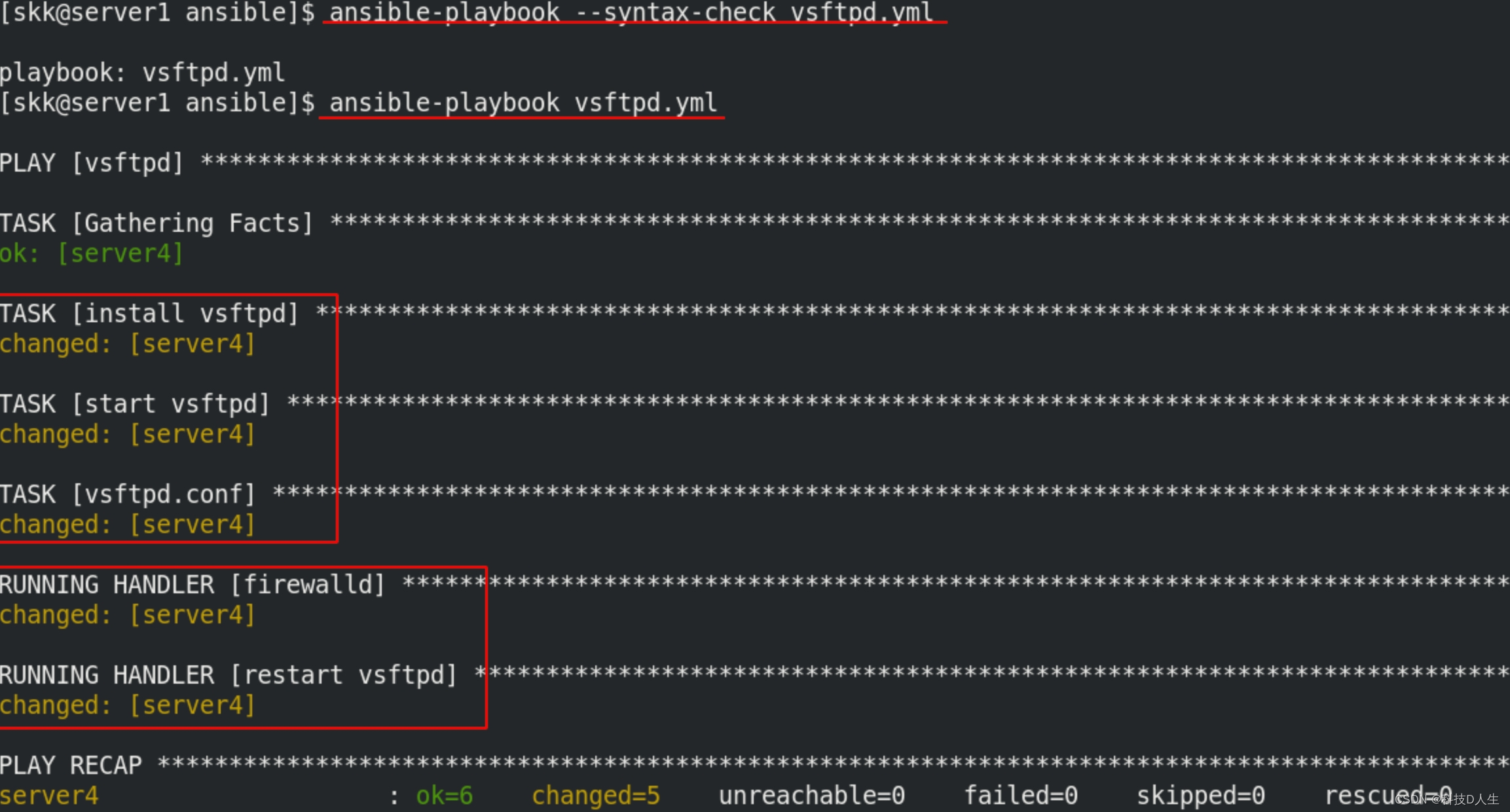
stay server4 Of /mnt/file Add content to , Anonymous access testing
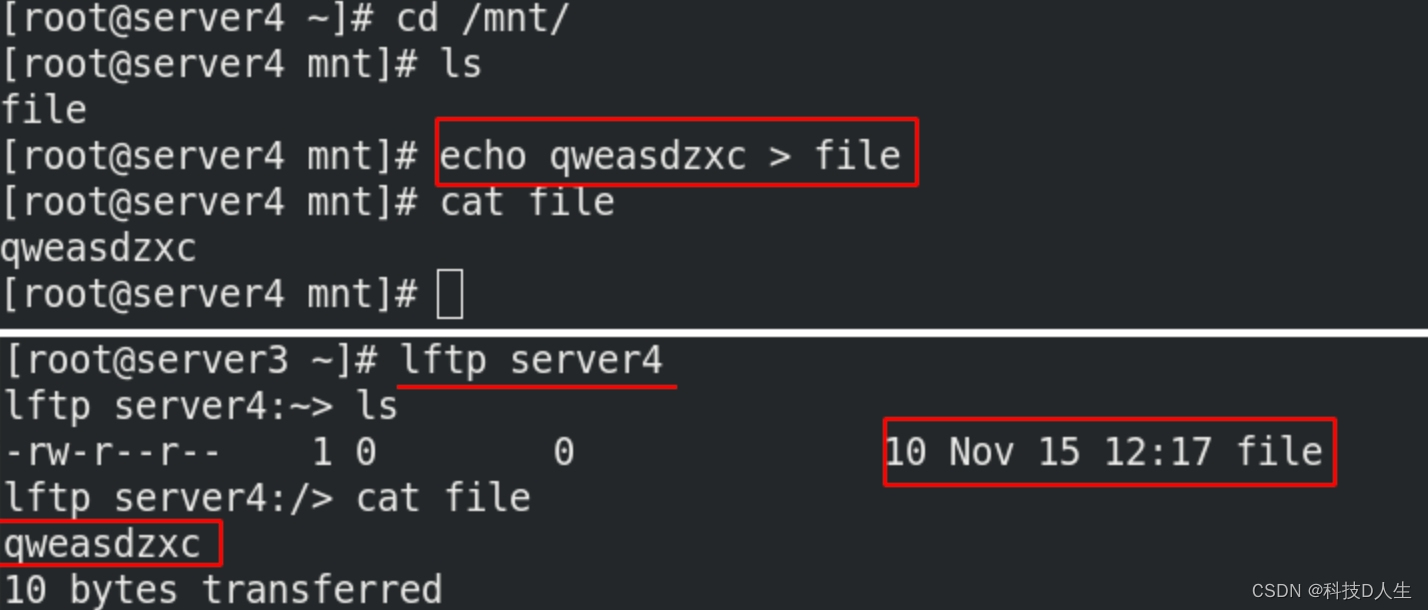
Four 、 Handling failed tasks
ignore_errors
effect : When play When a task fails, it will terminate (ignore_errors: yes The task failure will be ignored and the following tasks will continue to run )
Example : Install a non-existent service
vim ignore.yml
---
- name: ignore_errors
hosts: server3
tasks:
- name: install haha
yum:
name: haha
state: present
ignore_errors: yes ## Ignore mistakes
- name: debug
debug:
msg: heloo lll
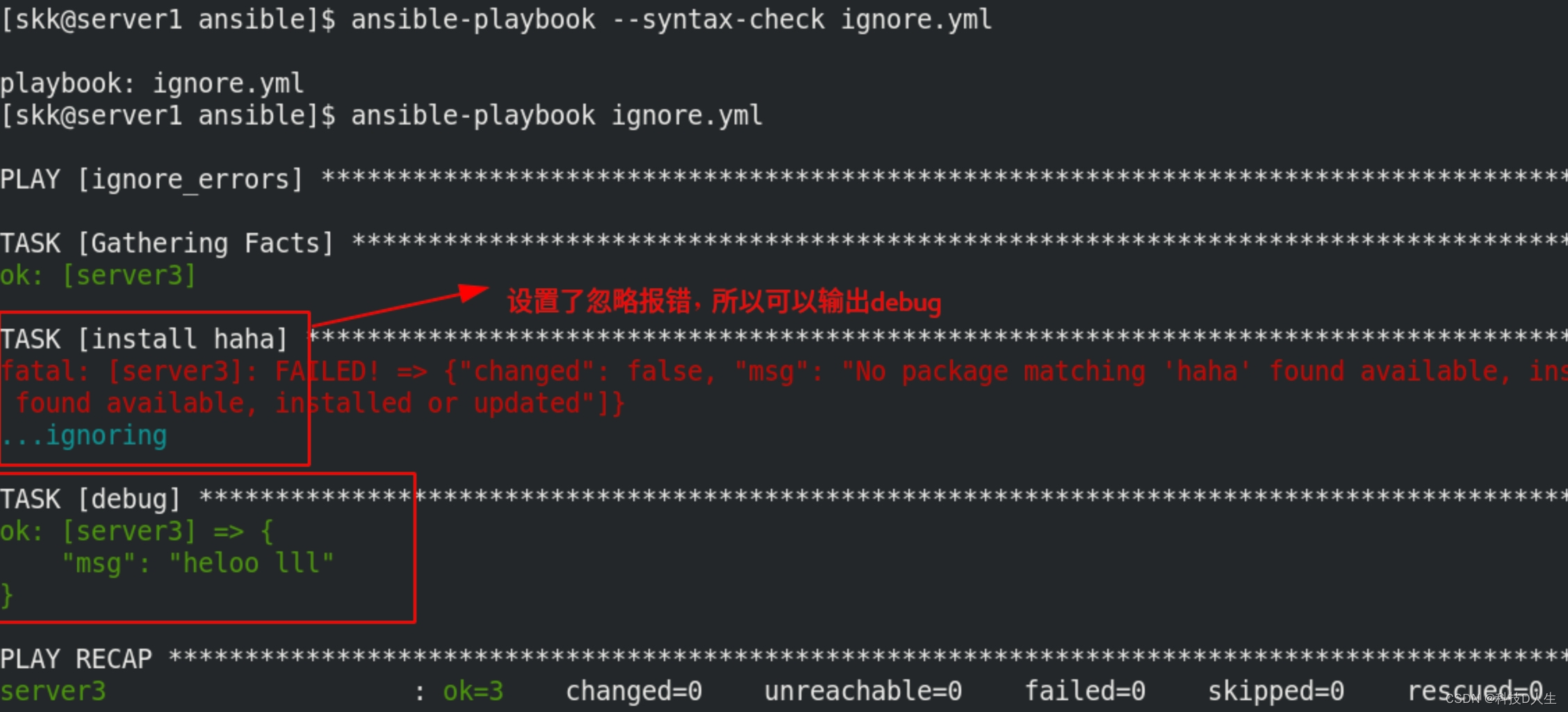
force_handlers
effect : When the task fails play If terminated, the trigger process will also be called
Example : Install a non-existent service , Task failed play There will still be triggers after termination ( Pay attention to removal ignore_errors: yes Interference of )
vim force.yml
---
- name: force_handlers
hosts: server3
force_handlers: yes ## After the task fails, it still triggers
tasks:
- name: hostname
shell:
hostname
register: info ## Use registered variables
notify:
- debug
- name: install haha
yum:
name: haha
state: present
handlers:
- name: debug
debug:
msg: "{
{ info['stdout'] }}" ## Show variables info The output variable of
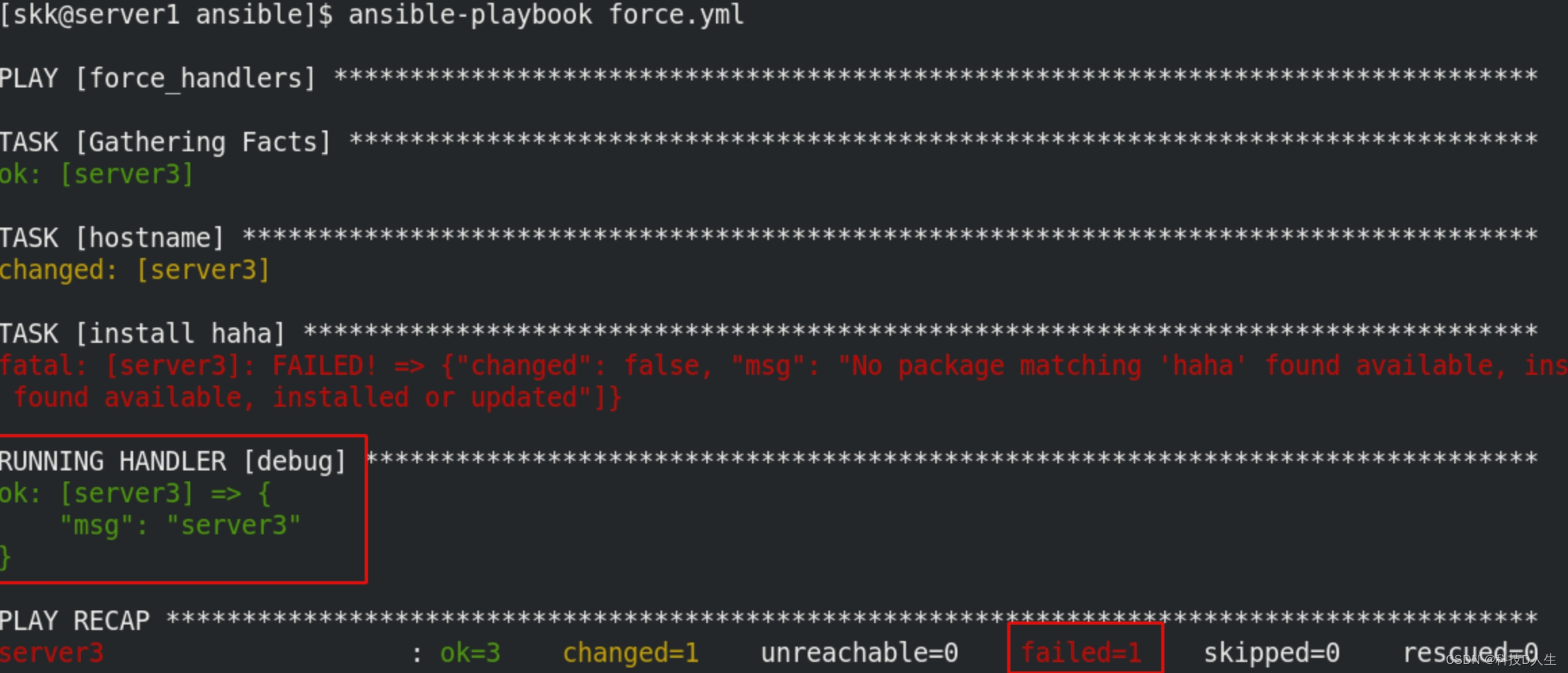
changed_when
effect : Controls when a task reports that it has made changes , Suppress changes
Example : test changed_when: true
vim changed.yml
---
- name: test
hosts: server4
tasks:
- name: install vsftpd
yum:
name: vsftpd
state: present
changed_when: true ## When detected vsftpd After installation ( Whether just installed or previously installed ), The report has changed
server4 Of vsftpd Has been installed before , Should be displayed in green , But it's yellow here

Example : test changed_when: false
vim changed.yml
---
- name: test
hosts: server4
tasks:
- name: remove vsftpd
yum:
name: vsftpd
state: absent
changed_when: false ## When detected vsftpd When uninstalled , The report does not change
Uninstall... Here vsftpd, There should be a change to yellow , But it's green

failed_when
effect : When the conditions are met, the mandatory task fails , But it doesn't change the behavior of the task itself
Example : create file , Report errors , But the essence has been established
vim failed.yml
---
- name: test
hosts: server2
tasks:
- name: touch file
file:
path: /mnt/failedfile
state: touch
failed_when: true ## An error is reported after the file is created

But the actual file was created successfully

example : Create a file in a directory that does not exist , But report success
vim failed.yml
---
- name: test
hosts: server2
tasks:
- name: touch file
file:
path: /mnt/haha/linuxfile
state: touch
failed_when: false ## No error is reported when the file is not created

Naturally, the file was not created

block
block: Define the tasks to runrescue: Define whenblockThe task that runs after a failed task appears in the sentencealways: Define the tasks that will eventually run independently
Example 1: here /mnt/file There is
vim block.yml
---
- name: test
hosts: server4
tasks:
- name: check file
block:
- name: test
shell: test -e /mnt/file
- name: debug
debug:
msg: /mnt/file is exist
rescue:
- name: debug
debug:
msg: /mnt/file is not exist
always:
- name:
debug:
msg: good night!
therefore block There is no failure in the sentence , So it won't execute rescue modular
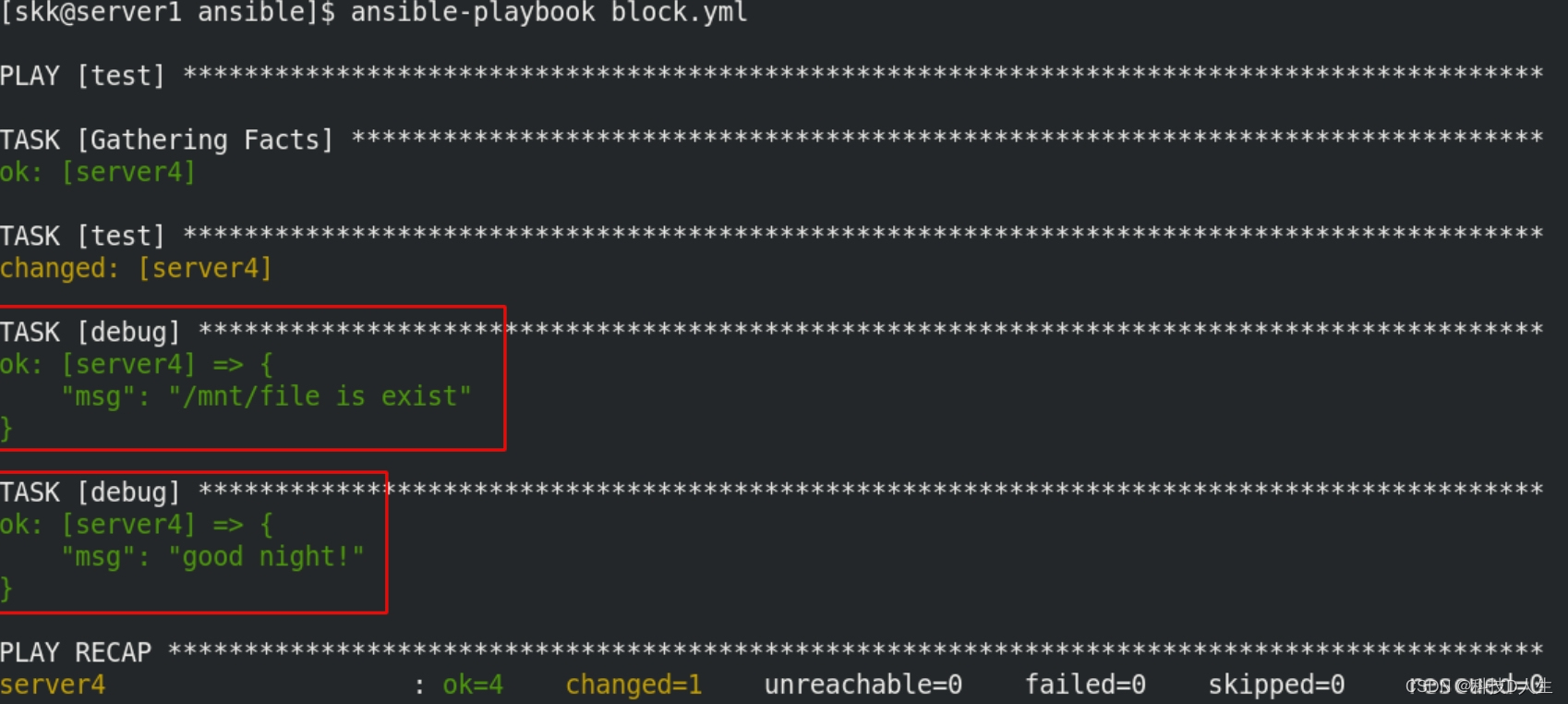
Example 2: here /mnt/file non-existent , Re execution block.yml, because block There is a failure in the sentence , So execute rescue modular
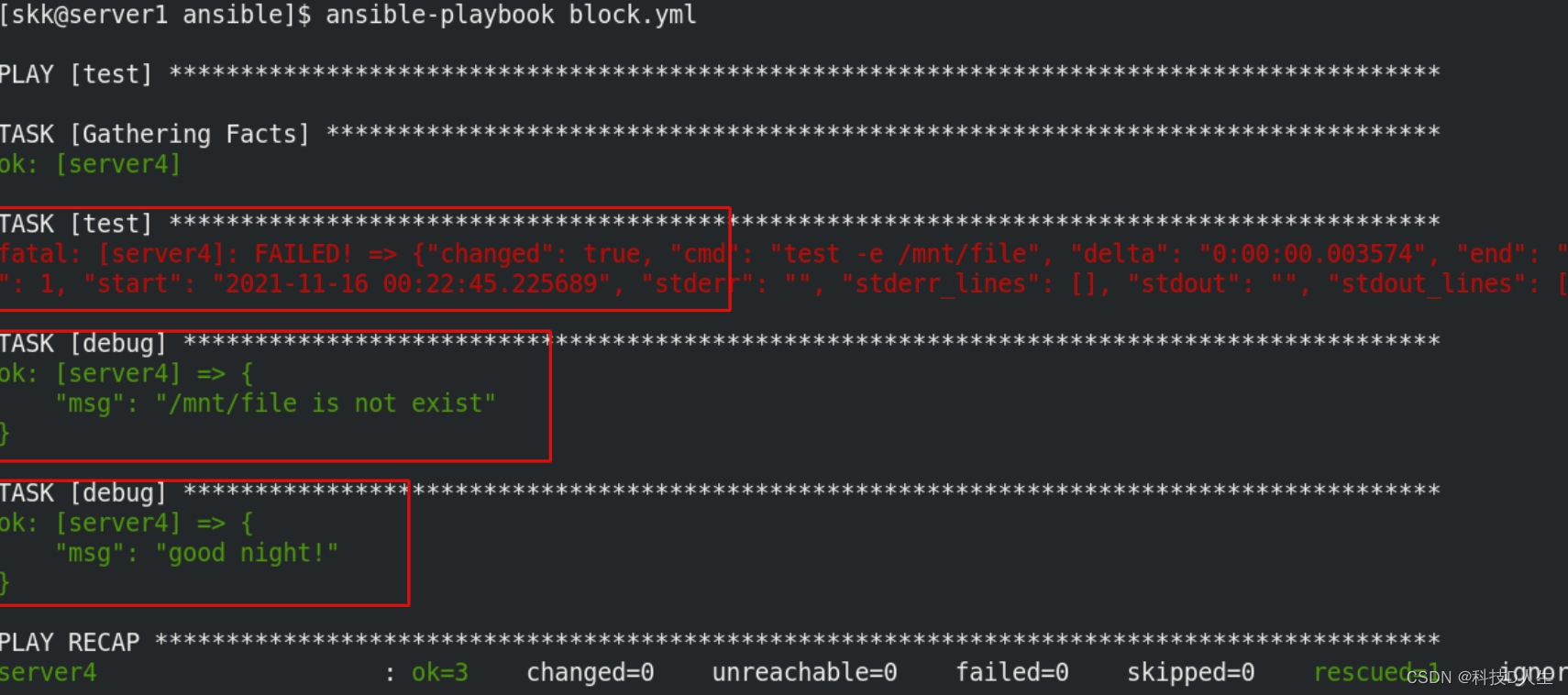
边栏推荐
猜你喜欢
随机推荐
LeetCode1051(C#)
【TPM2.0原理及应用指南】 1-3章
swiper左右切换滑块插件
命令模式 - Unity
让保险更“保险”!麒麟信安一云多芯云桌面中标中国人寿, 助力金融保险信息技术创新发展
DatePickerDialog and trimepickerdialog
【网络攻防原理与技术】第1章:绪论
textSwitch文本切换器的功能和用法
【TPM2.0原理及应用指南】 9、10、11章
企业经营12法的领悟
基于PyTorch利用CNN对自己的数据集进行分类
Functions and usage of imageswitch
Ratingbar的功能和用法
运行yolo v5-5.0版本报错找不到SPPF错误,进行解决
Lex & yacc of Pisa proxy SQL parsing
本周小贴士131:特殊成员函数和`= default`
阿富汗临时政府安全部队对极端组织“伊斯兰国”一处藏匿点展开军事行动
TabHOST 选项卡的功能和用法
<代码随想录二刷>链表
Mysql 索引命中级别分析

